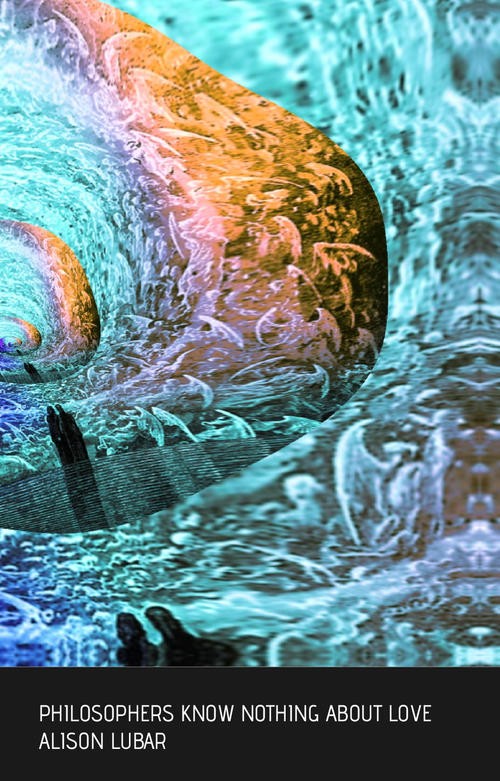Philosophers Know Nothing About Love
Thirty West Publishing House
$10.99
You can purchase a copy here.
Reviewed by Abbey J. Porter
In her new chapbook, Philosophers Know Nothing About Love, Alison Lubar explores the power—and danger—of one of life’s great motivating forces: romantic love.
Philosophers may know nothing about love, but Lubar has plenty to say on the topic. She describes an elemental force as potent as nature itself. “Seismic moments shift/ the soul's tectonics,” she says in the collection’s opener, “A Prize for the Gladiator in the Midst of an Earthquake.” And it seems these changes are lasting, as "Even the pearl rolled once/in a palm is never the same.”
This work is sensuous and passionate, with a touch of the bacchanalian; references to alcohol abound. Yet Lubar also imbues her poems with a sense of the sacred.
Lubar’s love is comprehensive, consuming. In “Lacuna,” Lubar invites:
twist yourself around me the way sinew
winds with bone, circuit complete and electric
alive with every wire vein, slip back into muscles
before memory, swallow every cellular space
Such connection has the potential to subsume. In “Six Months Above and Below,” Lubar suggests the impending end of a relationship with “a harbinger of looming solitude.” She goes on to describe the impact of that rift: “I'm halfway/over the balcony’s matte aluminum railing.”
Lubar’s narrator also loses her sense of identity while in a relationship. In the baldly confessional “Love Downhill,” she says, “It took Sisyphus more time to roll his rock than for me/to lose all sense of self and look for it in you.” She continues, “The curse is to push onwards and up, blinded by the beloved—/your gravity pulling me upward toward the high of the fall.”
Lubar further describes the disorienting power of a romantic relationship in “Grav(e)ity as an Alarming Force”: “I forget how to alphabetize. Letters only/go in order of your name.”
Clearly, such absorbing affiliation poses danger. “We know it might have been better/not to know the results of collision,” she writes in “Misdivined.”
Indeed, love’s very intensity can lead to its destruction. In “Covered Fire,” Lubar refers to a fire that “will snuff itself between two sheets.” And in “Last Poem,” the narrator describes her face being “White like stars’ bellies bursting fire, immolated for a love of light.”
The tone of these poems is serious, and somewhat urgent. Lubar is masterful at distilling moments and impressions and describing the details, the small things, that mean much:
the last inch of water
you left in the paper cup (melted
ice kissed by whiskey)
Her writing is precise. She uses brackets to create additional nuances and layers of meaning, as in “the life/I [could never really] return to.”
Lubar’s poems are full of departures, of relationships ending. In “The Lobby Sees All Lovers Leave,” romantic connections seem something tawdry, not meant to last:
hotel-entryway roses
with shredded polyester
edges frayed as time’s fabric
watch love affairs
end in elevators
Yet the endings are not necessarily permanent. Lubar writes of metamorphosis, of
transmutation: metamourphic [sic]
reassembling a coin into a ring,
(re)fill the cup from bottom-up.
In “Final Triptych,” in which she describes a relationship’s demise, she confides, “Sometimes I still find myself still blindly/loving you, as natural as blinking.” Love thus continues, transcending the bounds of the liaison. “I will keep you in my cells for seven years,” she says in “The Currency of Self.”
The chapbook is divided into sections, each of which opens with a quote from Plato’s “The Allegory of the Cave.” In that work, people chained to the wall of a cave mistake shadows on the wall for reality. When one person escapes, he experiences enlightenment when he discovers the real world outside the cave. I wonder whether Lubar intends to equate love with such comprehension.
She frequently connects earthly love with the celestial. In “Interstellar Light as Love”–the final poem of the collection, and likely my favorite—she says:
There are no seasons without
turning away and back again—
and that's love. Even the light of a dying star,
still goes on forever, still illuminates eternity.
Lubar seems to suggest that there is something natural in love’s comings and goings, and that the experience of love produces a positive effect that endures beyond a relationship’s end.
Philosophers Know Nothing About Love makes for a somewhat dense read. I found myself pausing to look up philosophers, characters from Greek mythology, and the occasional unfamiliar word. But the effort pays off with a rich, thoughtful inquiry into the bonds of affinity that move and shape us.
Abbey J. Porter writes poetry and memoir about people, relationships, and life struggles. She holds an MFA in creative writing from Queens University of Charlotte, an MA in liberal studies from Villanova University, and a BA in English from Gettysburg College. Abbey works in communications and lives in Cheltenham, Pa., with her two dogs.


